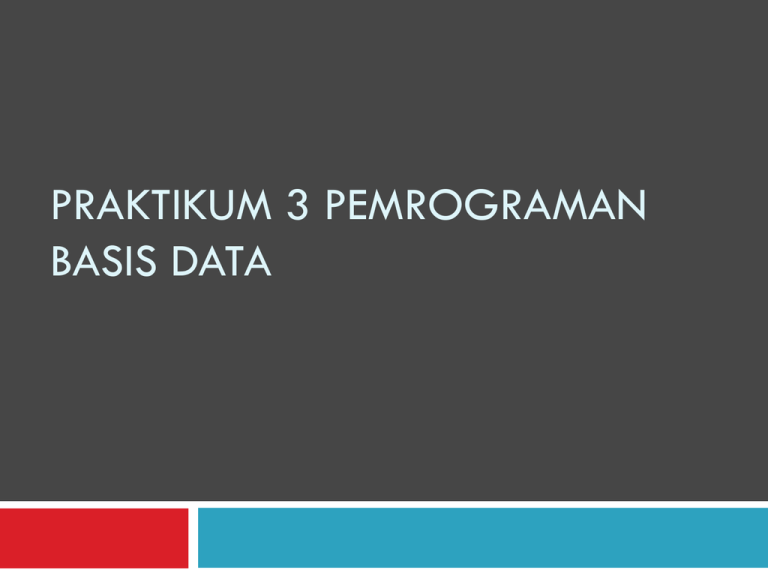Praktikum 3
advertisement

PRAKTIKUM 3 PEMROGRAMAN BASIS DATA Menghapus baris Deleting rows- DELETE FROM Use the DELELE FROM command to delete row(s) from a table, with the following syntax: -- Delete all rows from the table. Use with extreme care! Records are NOT recoverable!!! DELETE FROM tableName -- Delete only row(s) that meets the criteria DELETE FROM tableName WHERE criteria contoh mysql> DELETE FROM products WHERE name LIKE 'Pencil%'; mysql> SELECT * FROM products; Beware that "DELETE FROM tableName" without a WHERE clause deletes ALL records from the table. Even with a WHERE clause, you might have deleted some records unintentionally. It is always advisable to issue a SELECT command with the same WHERE clause to check the result set before issuing the DELETE (and UPDATE). Loading/exporting data from/to a text file There are several ways to add data into the database: (a) manually issue the INSERT commands; (b) run the INSERT commands from a script; (c) load raw data from a file using LOAD DATA or via mysqlimport utility. LOAD DATA LOCAL INFILE ... INTO TABLE ... Besides using INSERT commands to insert rows, you could keep your raw data in a text file, and load them into the table via the LOAD DATA command. For example, create the following text file called "produk_in.csv", where the values are separated by ','. The file extension of ".csv" stands for Comma-Separated Values text file. \N,PENC,Pensil 3B,500,3000 \N,PENC,Pensil 4B,300,3500 \N,PENC,Pensil 5B,800,3750 \N,PENC,Pensil 6B,400,4000 mysql> LOAD DATA LOCAL INFILE 'd:/produk_in.csv' INTO TABLE produk COLUMNS TERMINATED BY ',' LINES TERMINATED BY '\r\n'; Notes: You need to provide the path (absolute or relative) and the filename. Use Unix-style forward-slash '/' as the directory separator, instead of Windows-style back-slash '\'. The default line delimiter (or end-of-line) is '\n' (Unix-style). If the text file is prepared in Windows, you need to include LINES TERMINATED BY '\r\n'. For Mac, use LINES TERMINATED BY '\r'. The default column delimiter is "tab" (in a so-called TSV file - Tab-Separated Values). If you use another delimiter, e.g. ',', include COLUMNS TERMINATED BY ','. You must use \N (back-slash + uppercase 'N') for NULL. Select …into outfile … Lihat hasil file yang dibuat pada d:/… More than one tables One to many relationship Masing-masing produk memiliki satu suplier, dan setiap suplier menyuplai minimal nol atau lebih produk. Buat tabel suplier dengan atribut id_supl(int), nama_supl (varchar(3)), dan telp (char(8)) Id_supl (int) Nama_supl(varchar) Phone (char(8)) 501 Perusahaan ABC 88882222 502 Perusahaan XYZ 77773333 503 Perusahaan KLM 77772222 Tabel Id_produk Kode_produk Nama_produk Jumlah Harga Id_supl 1001 PEN Pulpen merah 500 3500 501 1002 PEN Pulpen Hitam 1000 3500 501 1003 PEN Pulpen biru 1000 3500 501 1004 PENC Pensil 6B 400 4000 502 1005 PENC Pensil 5B 800 3750 502 1006 PENC Pensil 4B 300 3500 503 1007 PENC Pensil 3B 500 3000 503 Buat tabel suplier Masukkan data suplier Buat kolom id_suplier pada tabel produk Tambahkan id_suplier sebagai foreign key pada tabel produk Ganti id supl pada masing-masing produk Select with Join SELECT command can be used to query and join data from two related tables. For example, to list the product's name (in products table) and supplier's name (in suppliers table), we could join the two table via the two common supplierID columns Join via where clause (legacy and not recommended) Gunakan alias ‘AS’ untuk menampilkan nama kolom Many to Many Setiap produk dapat disuplai oleh banyak suplier dan setiap suplier dapat menyuplai banyak produk. Buat sebuah tabel baru, sebagai tabel penghubung (junction/join tabel) yang diberi nama tabel suplier_produk. Tabel suplier_produk Id_produk (foreign key) Id_supl (foreign key) 1001 501 1002 501 1003 501 1004 502 1005 503 1006 503 1007 503 Masukkan nilai untuk suplier_produk Hapus kolom id_supl pada tabel produk, karena ini hanya berlaku pada one to many relationship. Sebelum menghapus kolom id_supl, kita hilangkan dulu foreign key yang ada pada column tersebut. Karena key merupakan constraint yang diberikan oleh sistem, maka kita masuk ke sistem databasenya. One to one relationship Backup The syntax for the mysqldump program is as follows: -- Dump selected databases with --databases option > mysqldump -u username -p --databases database1Name [database2Name ...] > backupFile.sql -- Dump all databases in the server with --all-databases option, except mysql.user table (for security) > mysqldump -u root -p --all-databases --ignore-table=mysql.user > backupServer.sql -- Dump all the tables of a particular database > mysqldump -u username -p databaseName > backupFile.sql -- Dump selected tables of a particular database > mysqldump u username -p databaseName table1Name [table2Name ...] > backupFile.sql Backup Keluar dulu ke bin Lihat hasilny pada d:/projek








